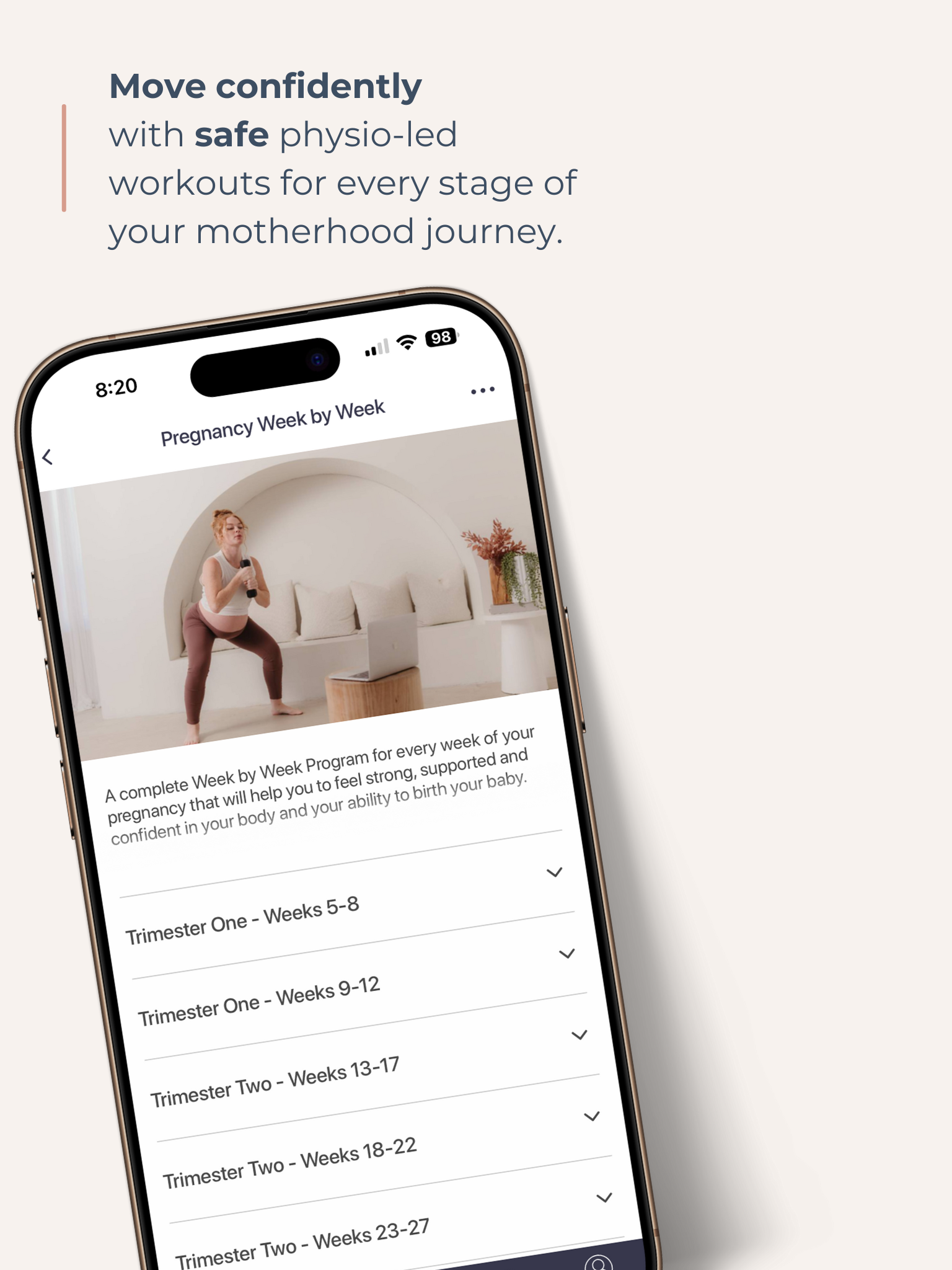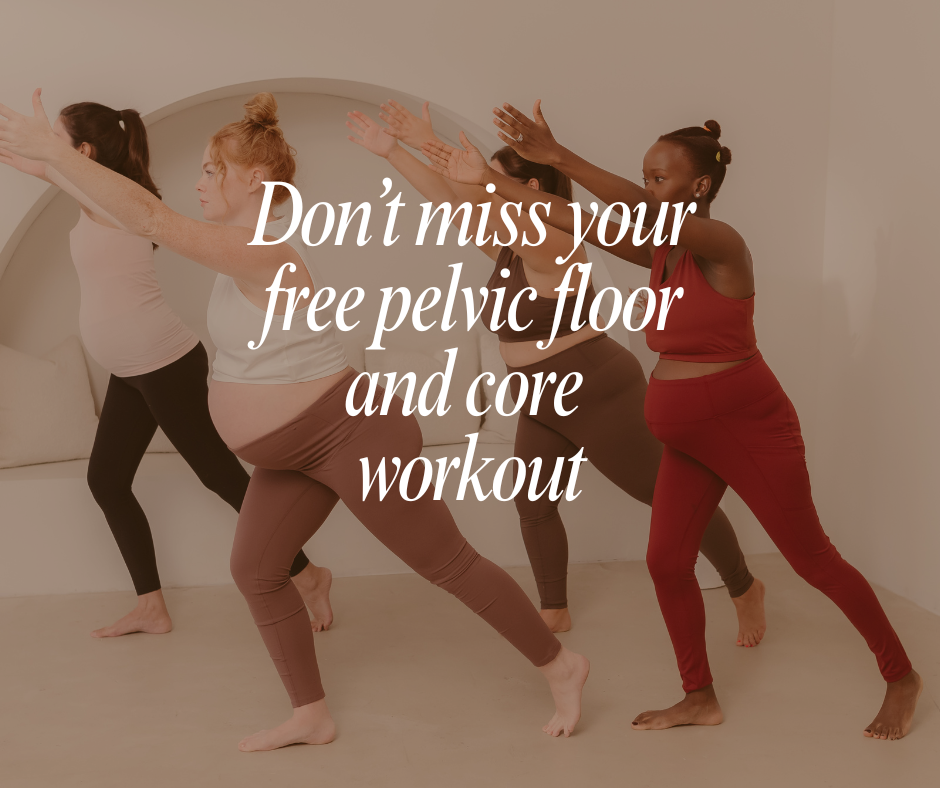Your Six Week Check - Why You Need More than 30 Minutes at the GP

By Lyz Evans - Titled Women's Health Physio
You may have heard of the 6-week postnatal check. It is often viewed as the ‘holy grail’ for women for post-birth clearance. Whether it be to swim, to lift heavier than 4kg, return to exercise, to drive, or for some keen Mummas to return to sex, the 6-week check can be long-awaited.
There are a few reasons why you should seek additional advice regarding your return to exercise.
As it stands in Australia the six-week check is performed by a GP, Midwife or Obstetrician in a 25-35 minute appointment. In this appointment, they assess everything from wound healing, uterus contraction, cessation of bleeding, mental health, family planning, mother and baby interaction, lactation, baby’s growth, and mother’s physical health, vaccinations and many other things.
A one-off 25-35 minute appointment is simply not sufficient time to assess all of these things adequately. Let alone give clearance for tasks such as running (which quite frankly is something no one should be cleared for at 6 weeks post-birth). This is not the fault of the health professional doing the 6-week post-natal check. They are doing their best and feel the pressure too. It is simply a case of this is how it has always been done, but it is time for a change.

The good news is in recent years a few things in postnatal care have progressed
-
Improvements in medical imaging of the deep pelvic floor mean an increase in understanding of the prevalence and severity of pelvic floor tears (avulsions) that are not able to be seen at the time of birth. This occurs in 20-40% of births and increases women’s likely hood of longer-term incontinence and prolapse. It is something that early identification and management are incredibly important, and one of the reasons all women should have a thorough check with a women’s health Physiotherapist including an internal pelvic floor exam.
-
The role of the Women’s Health Physiotherapist for women post-birth regardless of vaginal or caesarean is gaining recognition. There is more women’s health Physiotherapist trained worldwide than ever due to the increasing demand. In places such as France and Scandinavia pelvic floor Physiotherapy if offered to ALL women as a part of a routine government-funded postnatal care, which is exactly how it should be in Australia.
-
A women’s health Physiotherapist will assess physically everything that a GP, Midwife, or Obstetrician simply do not have the time or skills to do. It can be essential for identifying issues before they turn into a problem, or addressing those already present minimising progression. Prevention is much better than cure.
-
Women’s own experience, word of mouth and social media mean community awareness of pelvic floor symptoms that are not usually discussed as well as the importance of prevention is now a priority. Women are demanding a higher level of care and we can see this in the increase in the number of Women self-referring to women’s health physiotherapists.
And finally, the faculties of Obstetrics have recognised a need for change. In 2018 the American College of Obstetricians and Gynaecologists (ACOG) determined that rather than an arbitrary 6-week check, women should receive ongoing postpartum care starting at 3 weeks postpartum.
What to Expect at Your Physio Appointment
A women’s Health Physiotherapist specialises in the assessment of the physical post-natal body. They will spend an hour taking a detailed birth history and presence of symptoms, then undertake a detailed assessment of the pelvic floor, abdominal muscles, and previous injuries, and undertake a biomechanical assessment of the musculoskeletal system. The assessment will include an external structural assessment, real-time ultrasound and a detailed internal vaginal exam.
Once you have made your appointment, here is a little snapshot of what you can expect.
Pelvic Floor Assessment
Ideally, your pelvic floor strength and function will be assessed under ultrasound and also internally. Let’s be honest. The internal assessment can feel a little strange. But it is the best way for a Physio to determine exactly the health and functionality of your pelvic floor. It is always your choice whether you decide to proceed with this component of the appointment. Your physio will be checking for pelvic floor function, tear recovery, scar tissue quality, anal sphincter function, bladder, bowel and uterus position, avulsion assessment, sexual function, and prolapse risk.
If there are any issues that require further treatment or support then you will be able to identify them in this first appointment and get the support you need which will hopefully save you a lot of frustration down the track.
Transversus Abdominis Assessment
Here they will check for the degree and depth of stomach separation and also see if you are able to engage your transversus abdominis (TA). This will help to give an idea of what your core strength and control is like. Using the ultrasound to have a visual cue of what a good engagement of TA feels like really helps a lot of women to begin to properly activate this muscle.
Pelvic Assessment
The structure of the pelvis can change during pregnancy and birth. If you are pregnant or have been pregnant, you probably would have noticed a widening of your hips coupled with increased instability through your pelvic joints. Perhaps you even had pelvic or lower back pain as a result of these changes. Your physio will assess your pelvis and look for any pelvic instability or injury.
Postural and Musculoskeletal Assessment
In addition, your physio will likely look at your posture, pelvis and general muscle and joint function.

What you can expect to walk away with!
After our appointment, you will have a clearer understanding of:
- Your pelvic floor strength and function.
- Your core strength and function.
- How to manage any incontinence you may be experiencing.
- Personalised core and pelvic floor exercises.
- How to modify certain exercises to suit your body type.
- What exercise you should be doing.
- What exercise you should be avoiding (for now)
- Whether you need any follow-up treatment or support
- Whether you need any support in the form of pessaries or supportive garments.
Tip! Show your Physio the Empowered Motherhood Program and work with them to choose the best workouts for you at your exact stage of postpartum recovery.
Reference:
The American College of Obstetricians and Gynaecologists. Presidential task force on redefining the postpartum visit. Optimizing Postpartum Care. ACOG committee opinion Number 736. May 2018.
Get your Free Physio-led Pelvic Floor and CoreWorkouts
Download three free videos for either pregnancy or postpartum.






